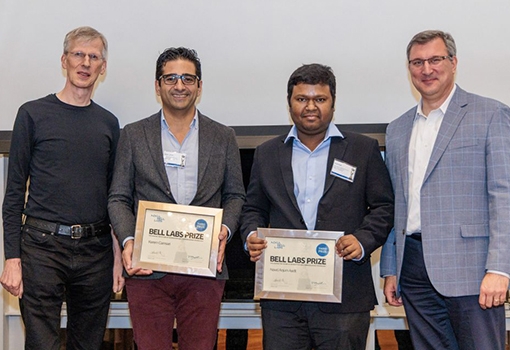UC Santa Barbara electrical and computer engineering (ECE) assistant professor Kerem Çamsarı and his PhD student, Navid Anjum Aadit, won third place in the 2023 Bell Labs Prize Competition. The annual international competition gives researchers around the world the chance to collaborate with world-renowned Nokia Bell Labs researchers and to shine a spotlight on their innovations, showing their potential to impact society. Competing against more than one hundred other proposals, Çamsarı and Aadit received the Bronze Medal and a $25,000 prize for their project, “Probabilistic Computing with p-bits: From Concept to Supremacy.”
“We are thrilled to receive this recognition from Bell Lab, especially given its history in computing and its impact on nearly everything that we interact with every day,” said Çamsarı. “I am doubly proud for Navid’s groundbreaking achievement. He was the first PhD student in my lab, and I couldn’t wish for a better student whom I can now confidently call a colleague.”
“Bell Labs has a legacy of advancing science, and being recognized by them is truly special,” added Aadit, referencing the fact that Bell Labs researchers have invented many of the foundational technologies that underpin information and communication networks, digital devices and systems, and nearly 25 percent of the technologies that form the foundation of today’s internet. “I am grateful to my advisor, Professor Çamsarı, for this invaluable opportunity. It wouldn’t be possible to achieve this recognition at such an early stage of my career without his guidance.”
Probabilistic computing is a novel approach of reimagining computers to address the fact that a large number of models in machine learning (ML) and artificial intelligence (AI) are inherently probabilistic, meaning they model or make guesses at a right answer from a set of plausible answers.
Aadit offers an everyday example from a ride-sharing scenario, suggesting that if there is only a slight price difference between two options, a person might lean toward choosing the service that has an earlier pick-up time. In such a scenario, he explains, “A deterministic solution isn’t always required. Instead, a probabilistic solution that quickly offers the best available option is more practical and efficient. That is the basis behind designing a computer to solve probabilistic problems.”
Traditional computing is based on deterministic bits, which must have one of two values — 0 or 1 — at any given time. They never fluctuate and change according to a specific computation. Tremendous amounts of energy are required to complete computations in classical computers using what is currently available, silicon transistors called Graphical and Tensor Processing Units (GPUs/TPUs).
The Çamsarı lab, also known as the OPUS (Orchestrating Physics for Unconventional Systems) Lab, has been designing a new fundamental hardware building block, called a probabilistic bit, or p-bit, to allow the kind of probabilistic behavior needed to build a probabilistic computer. A p-bit fluctuates constantly between 0 and 1 and uses naturally occurring thermal noise in the environment to fluctuate and enable probabilistic behavior. Researchers in the group built a prototype by modifying a nanodevice used in magnetic memory technology to provide true randomness. Çamsarı and Aadit, showed the potential of their novel work during the Bell Labs competition, solving optimization and quantum problems with their probabilistic computer prototype during a live demonstration.
“Our prototype is a first generation, but it is already outperforming state-of-the-art GPUs or TPUs in speed and efficiency by about two orders of magnitude,” said Aadit, a third-year ECE PhD student, who earned a bachelor’s degree in electrical and electronic engineering from Bangledesh University of Engineering and Technology and a master’s degree in electrical engineering from UC Irvine.
“In every event or conference that we attend, we receive valuable feedback from a diverse set of people,” added Çamsarı, who has previously received an Early CAREER Award from the National Science Foundation and a Young Investigator Award from the Office of Naval Research. “The Bell Labs competition provides an important data point for us to see that our work on probabilistic computing has transformative potential.”
The group’s present challenge is to scale up the system to a level where it can serve as a table-top super computer tailored for probabilistic applications. The team has already initiated the next steps to enhance their prototype.
“There are many challenges, different angles to consider, from hardware to algorithms, but we are excited and actively working on it,” said Aadit. “As a PhD student, this Bronze Medal boosts my confidence that I am on the right track. For our team, this recognition further motivates us to push the boundaries and enhance our project.”

Kerem Çamsarı (second from the left) and his PhD student, Navid Anjum Aadit (second from the right), received a Bronze Medal during the Bell Labs Prize Competition.
